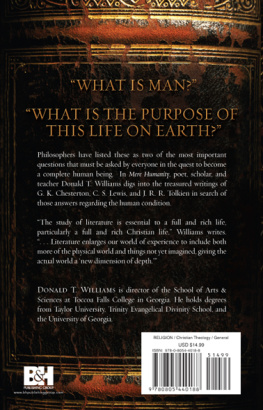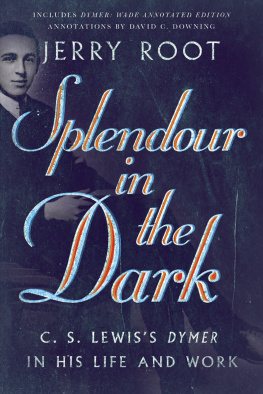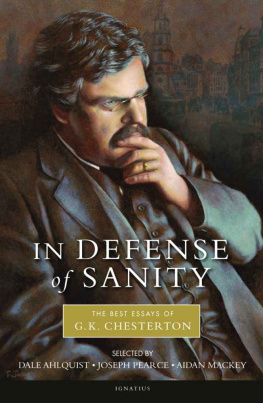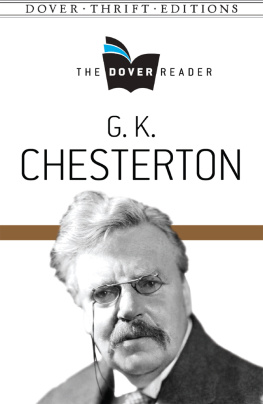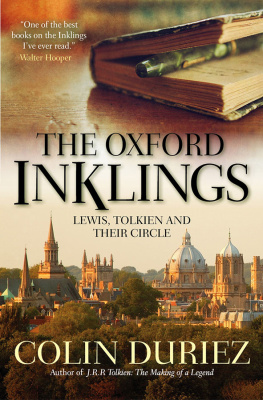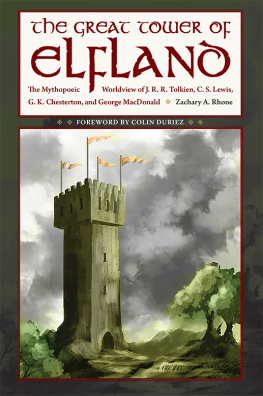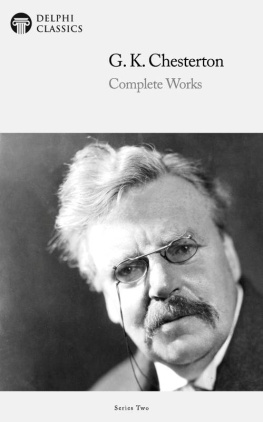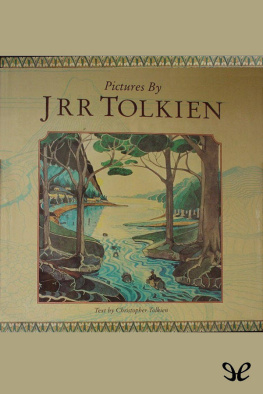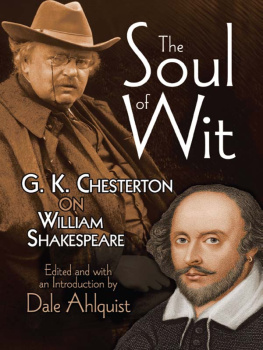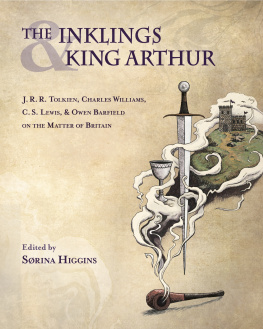
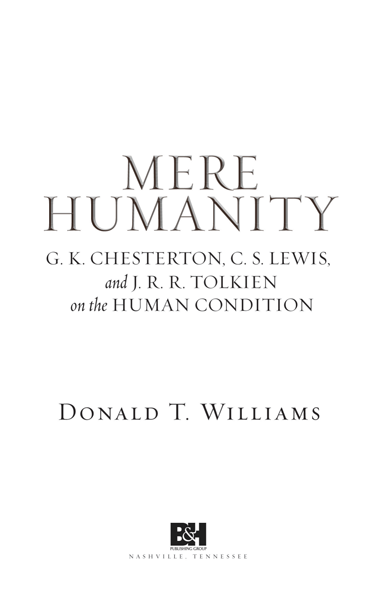

Humanity practically was things that didn't have a position
in space and time;
such as imagination, pity, hope, history, and belief.
Take those away and all you had was an
ape that fell out of trees a lot.
Terry Pratchett, Thief of Time
Our primary business in life is not business,
or construction work, or sales, or teaching, or even motherhood,
but becoming a complete human being.
Peter Kreeft, Back to Virtue
What a piece of work is a man! How noble in reason!
How infinite in faculty!
In form and moving how express and admirable!
In action how like an angel!
In apprehension how like a god! The beauty of the world!
The paragon of animals!We are arrant knaves all.
William Shakespeare, Hamlet
I will not call it my philosophy; for I did not make it.
God and humanity made it; and it made me.
G. K. Chesterton, Orthodoxy
ACKNOWLEDGMENTS
Special thanks are due to Edie Dougherty and the Southern California C. S. Lewis Society, whose gracious invitation allowed the seed of what would become this book to germinate at their annual summer workshop at the Benedictine Abbey of Valyermo, California, some years ago. To the rich soil and gentle rain of their warm intellectual and spiritual companionship, the resulting plant owes much of whatever strength it may have.
A condensed version of the introduction and the first three chapters appeared as Is Man a Myth?: Mere Christian Perspectives on the Human, in Mythlore. I am grateful to all these publications for permission to reprint this material.
Friends and scholars such as Michael Bauman, Joe R. Christopher, Bruce L. Edwards, David Mills, Chris Mitchell, and Ted Sherman have read various parts of the manuscript and offered valuable suggestions. The errors which remain are manifestly my own.
Prelude
THE BODY HUMAN
________________________
________________________
Intricate engine angels might admire,
Material spirit, animated earth,
Crafted casket for celestial fire,
Doomed to die the day it has its birth.
Hands that open, befitting a gracious lord,
Able to touch a cheek as soft as mist,
To wield a pen, a brush, a harpsichord,
But just as apt to freeze into a fist.
Godlike image, able to stand erect,
Yet by what small and simple things laid low:
A sneeze, a scratch, a germ, and all is wrecked;
A few short years, the time has come to go.
Delicate instrument of love, or lust,
Admirably compactedout of dust.
D.T.W.
Introduction
IS MAN A MYTH?
Mere Christian Perspectives
on the Human
What is this quintessence of dust?
HAMLET, IN SHAKESPEARE'S HAMLET
IS MAN A MYTH? asks the title of one of Mr. Tumnus's books. In his world of Narnia, it was apparently an open question until a certain daughter of Eve named Lucy showed up to have tea with him. The nature of the white witch's interest in the matter might have given him a clue to its answer, but still, until Lucy arrived, it was a debatable question. It may seem ironic, but the faun's question has become an open one again in the very world which Adam's and Eve's descendants are filling to the brim: not, that is, whether something called humanity exists but whether man, considered in the traditional way as something qualitatively different from the animals, uniquely created as God's child and steward of the planet and hence able to have definite and dependable ideas about his own identity and purpose, is not actually a mythical beast. In this book we will take this question seriously and attempt some steps toward an answer.
The Question
Its Nature and Difficulty
What is man, the psalmist asked his God, that you are mindful of him? It was a good question and is a pressing one. Peter Kreeft lists it as one of the two most important questions we can ask: What is man? and What is the purpose of his life on this earth? In the case of mankind, this is especially true, for nothing else can be properly decided until we know the answer. Metaphysics (What is real?), epistemology (What can we know, and how do we know that we know it?), and ethics (What is the good?) are all affected, for it is we human beings who exist, who ask, and who choose. While other beings may also do these things, we have direct access to what they are like from the inside only as we do them ourselves. Hence, whatever concept of reality we have must be one that includes us. Any account of knowing that we accept must take into account the nature of the one attempting to know. And any definition of the good that guides us must be able to define what is good for precisely such beings as we discover ourselves to be, or it will be irrelevant to us.
The traffic between ourselves and these questions runs both ways. If we knew independently that only matter existed, for example, we would have to describe ourselves in purely materialistic terms. Everything we are, feel, know, and do would have to be completely describable in terms of atoms in motion. On the other hand, if we experience ourselves in ways that appear to transcend the purely
So far, so good. But what if we seem to get one kind of answer when looking inward subjectively and another when trying to look outward with objectivity? In other words, what if we can't honestly reduce ourselves, as we know them from the inside, to nothing more than atoms in motion, but when we look out at the universe that is all we can objectively detect? It could be argued that this is precisely the position in which we find ourselves. As Marion Montgomery, summarizing Etienne Gilson, puts it, We know, and know that we know, that life and meaning have real existence, though science cannot substantiate that reality because the reality at issue lies in a dimension of immateriality.
No one feels his or her self to be nothing but atoms unless he or she has already been influenced by a dogmatic materialism.
This dilemma is an inescapable datum that I have tried to summarize thus:
THOUGHT
_____________
_____________
Villanelle no. 24
Whence comes a reason's power to convince,
Illuminate the searching intellect
With sudden serendipity of sense?
No change of chemicals or elements
Could equal insight, letting us detect
Whence comes a reason's power to convince.
Electrical impulses give no hints,
Yield nothing that could cause us to expect
A sudden serendipity of sense.
A chain of neurons firing boldly prints
Its trace upon a screen which can't reflect
Whence comes a reason's power to convince.
By faith we must accept this light that glints.
The eye can't see itself, cannot inspect
Its sudden serendipity of sense.
A mystery much like the sacraments
Whose grace unseen we yet do not reject:
Whence comes a reason's power to convince?
From sudden serendipity of sense.
D .T.W.
Atoms in motion, in other words, simply cannot account for the fact that we know, perceive, and understand atoms in motion. They If physics is the whole story about the universe, it is hard to see why they shouldn't always have equal sayor more accurately, why there should be any say to be had.
Next page
